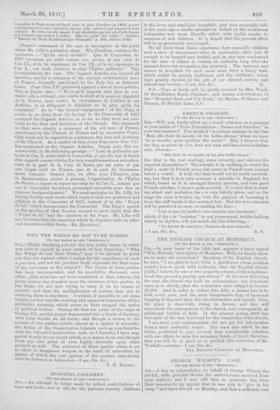FRENCH PROSODY.
(TO THE Eurrea OF THE " SPEC TATOR."1 Sra,—Will you kindly allow me a small criticism on a passage of your notice of "Prize Translations : Poems and Parodies," in your last number ? You speak of " a curious mistake in the line Mais elle Stint du monde oa les belles choses,' where we have de co monde,' quite spoiling the metre." May I observe that the line, as given by you, does not scan, and has eleven syllables only, whereas,- " Elle 6toit de ce monde oh lee plus bolWs theses " (for that is the real reading), scans correctly, and restores the required. alexandrine ? The mistake is in omitting to sound the final e, mute in French prose, but never in French verse (except before a vowel). A trifle like that would not be worth mention- ing, but that it is so very common a mistake in England, for which, found as it is amongst literary persons, and even good French scholars, I cannot quite account. It is true that in read- ing aloud and recitation the e is very faintly given, and on the stage the verse is broken up, with the purpose of loosening it from the stiff bonds of this metrical law. But the true scansion will be perceived at once, on reading the line,— "'lout co quo j'ai souffert, mes craintils, mes transports," which, if the e in " eraintes" be not pronounced, besides halting utterly in rhythm, will not match the line following,- " La fureur de mos feux, l'horrear de mos remords."


































 Previous page
Previous page